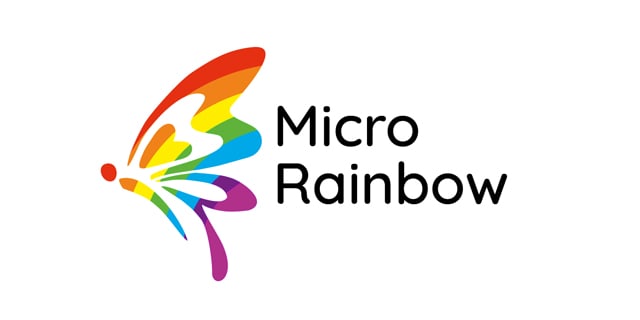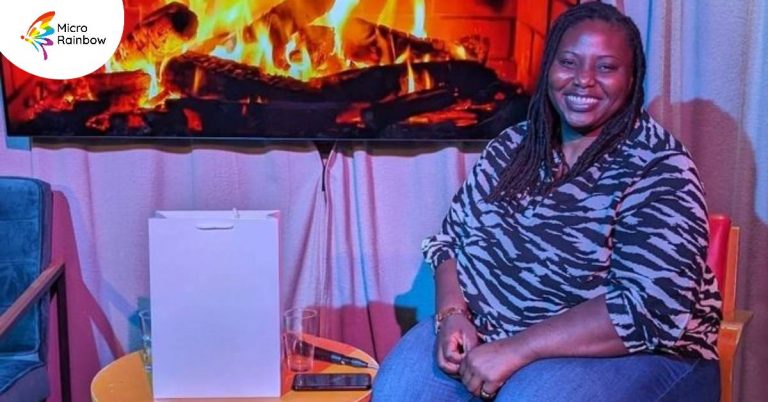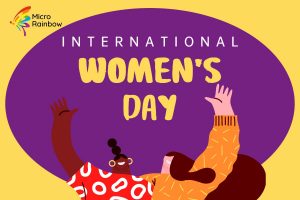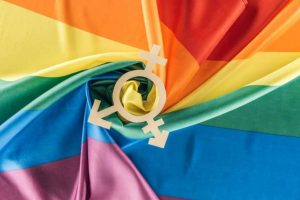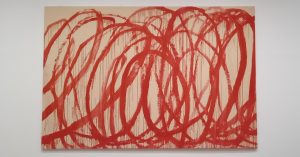Beginning the work
Moud Goba is Micro Rainbow’s National Director. Her work with LGBTQI refugees and asylum seekers is inspired by her own background. Moud is a lesbian woman and fled Zimbabwe in the early 00s to find safety in the UK. Moud has long been an advocate for the LGBTQI community but began her professional involvement with LGBTQI asylum seekers after she received refugee status in the UK. In 2013 she joined the Micro Rainbow team and brings her lived experience of being both an asylum seeker and refugee to the organisation to her work.
A lived experience
Moud Goba came to the UK from Zimbabwe in 2001 to escape lesbophobic persecution in her home country. Like all LGBTQI people seeking asylum in the UK, Moud Goba was required to ‘prove’ her sexuality and provide evidence to support it to the Home Office. This was despite coming from a place where having any evidence of her sexuality put her in danger. In 2024, it is still illegal to be LGBTQI in 67 countries around the world, and seven countries in which LGBTQI people can face the death penalty. LGBTQI people in these countries must do everything they can to keep their identity of sexuality secret.
Moud’s personal experience of seeking asylum has given her a deep understanding of the pain and hardship faced by the women Micro Rainbow supports. She emphasises the way “lived experiences helps you to understand” and “allows someone to empathise” much more deeply with the experiences of others, and aids her in her work. It’s for this reason that Micro Rainbow has prioritised employing team members who have lived experience of the UK asylum process.
Heightened awareness but no less work to be done
People seeking asylum in the UK have historically been and continue to be marginalised by society. This was the case when Goba first came to the UK in 2001 and remains the same now. However, one improvement has been the heightened awareness of the issues that cause people to flee their countries. As Goba says: “There is much more of an understanding for why people come here than before.”
Despite this increase in understanding of why people flee, awareness of the life experiences of LBTQI women remains low. For example, Goba shared that many lesbian women asylum seekers were forced into marriages while in their country of origin. They may have children from these marriages – fleeing their country often means they have had to leave them behind. Being married, and having children from these marriages, can count against these LBTQI women when they try and claim asylum based on their sexuality in the UK.
Every LBTQI woman has their own story and needs
All LBTQI women asylum seekers are unique. They all have different identities, backgrounds, stories, and strengths. This is why Goba emphasises the importance of taking the time to truly understand each woman who accesses support. This helps ensure their specific needs are understood and addressed.
Goba speaks of the way Micro Rainbow’s women’s work is deliberate. She elaborated on the intersectional approach that is used and the one-on-one relationships outreach officers create with beneficiaries to address personalised needs. Micro Rainbow also sets aside one safe houses for LBTQI women – many survivors of sexual violence do not feel safe living with men. This house ensures that they can feel secure, and ensure that “women don’t fall through the cracks”.
Special quality of a community of women
Moud Goba recognises that there is a special power that comes from creating a community of LBTQI women. She explained the sisterhood that is formed by being in a place where people know and understand your struggles. Within this place the ability to empower one another is exceptional.
Sista Sista is a crucial space for the creation of a community of women. Goba has seen valuable friendships form between the women in the group. She explained that some of the women will share their homes with other Sista Sista group members once they have received refugee status. They will recommend each other for jobs, always keeping each other in mind. Many of the women stay connected long after they have moved on from Micro Rainbow. The network of LBTQI women created through Sista Sista allows for a community mindset where success for one woman uplifts everyone.
Finding hope
When the system is made to actively go against the work one is trying to accomplish, hope can be hard to find. Yet, Goba finds an abundance of hope in the women she works with day to day.
She finds it in the “resilience of people”; she says women are resilient, and “women hang on”. One of her greatest joys is seeing the people she has worked with come back to Micro Rainbow so she can see them living and prospering. Women who have faced some of the darkest challenges this world has to offer demonstrate their strength through not only existing as themselves but thriving.
